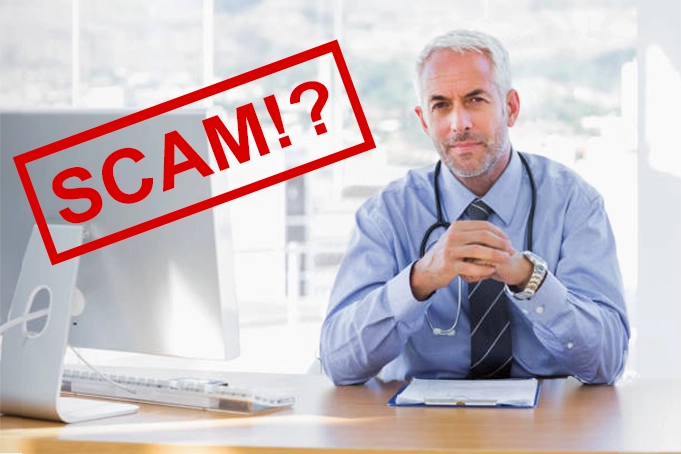
Written by David Lombardino | Updated February 29, 2024
Concerned Applicant!
A few years ago, I had a call from a concerned potential client. His question: How do I know your services are not a scam?
The caller went on to explain that he had read many horror stories on the Internet from others who had been swindled by companies purporting to provide personal statement services. Those companies had provided either poor results or simply no results at all.
For something this critical to his future, he wanted to talk to me personally to ensure we are different.
Why Do Scams Exist?
In my 15+ years of assisting both U.S. and international medical graduates with their personal statements for medical residency, and as the editor in chief and owner of DLA Editors & Proofers, I have seen many scams and many clients nervous about hiring us as a result.
Those purveying the scams know the candidates who most often seek help with their personal statements for medical residency come from outside the U.S. These candidates are less familiar with the process of applying for medical residency and as immigrants often feel a greater level of anxiety and even desperation about their applications.
There are people who, sadly, seek to take advantage of them.
My Personal View
From the thousands of international medical graduates we have assisted in their applications for medical residency, I know firsthand how overwhelming having to write the personal statement can be. Many struggle with the uniquely American concept of the “personal statement.” What does it mean that it is “personal”? What does it mean that it is a “statement”?
My experience first started with friends of mine in medical school and continued with my wife, who is also an international medical graduate.
What I learned from them, as well as from the many clients we have assisted since, is that the personal and professional challenges international medical graduates have to overcome in applying for residency in the U.S. develop in them a strength of character and humility that is difficult to find elsewhere, and make them better residents and doctors as a result.
Scam #1: The Offer to Write Your Personal Statement for You
The most common scam I have seen is the offer to write candidates’ medical residency personal statements for them.
With the pressure of organizing all that is needed for the ERAS applications, in addition to the time constraints of working and often also family responsibilities, I know how enticing it is to think that someone else can write your medical residency personal statement for you.
However, from what I have seen, and from the program directors, attendings, fellows and residents I’ve talked to, doing so would have a negative effect on your application.
Personal statements not written by the candidate are easy to spot and will cause the candidate’s application to be automatically rejected.
Even the most poorly developed but genuinely written personal statements will lead to a much greater chance of success than will the fanciest personal statement written by someone else.
Scam #2: Fake Reviews
Wisely, many applicants for medical residency seek to avoid potential personal statement scams by getting recommendations from others who have already gone through the process. But what if no one you know has gone through the process?
One option is to join online forums where candidates like you share their experiences. One popular one is USMLE Forums, where you can find rankings of the best personal statement writing and editing services.
When reading reviews, whether those posted in forums or those that service providers place on their own websites, it is important to remember that many, though not all, of the reviews online are fake.
The good news is that with just a little effort, you can learn whether they really know what they're talking about. Do they have an email address you can contact? A phone number you can call?
|
Are you looking for a personal statement service you can trust? If so, you’ll want to find a company that is transparent, honest and reliable. That’s where DLA Editors & Proofers comes in. Led by David Lombardino, DLA Editors & Proofers is a team of expert editors and consultants that helps applicants match to residency. With their expertise across many specialties, programs and unique candidate circumstances, DLA Editors & Proofers makes improving your personal statement easy until it’s ready for submission. So if you are looking for a personal statement service you can trust, take your time—use DLA Editors & Proofers to give your personal statement the edge it needs to set you and your application apart. Try DLA Editors & Proofers today, and take the first step toward working with a company that is transparent, honest and reliable. |
Scam #3: Services Offered by “Doctors”
Nothing is more important than ensuring the one you ask to help you with your personal statement has both the expertise and experience needed to guide you in achieving your most successful personal statement.
This means finding personal statement experts with a detailed knowledge of what it takes to write an outstanding personal statement on the one hand, and, on the other hand, the insight and talent to show you how to use your unique attributes and voice to draft your most successful residency personal statement.
One popular marketing strategy is to claim their services are being provided by “doctors.” For example, “Dr. So and So will personally review your personal statement” or “Our staff includes Dr. So and So.”
Savvy residency applicants ask themselves: If Dr. So and So is really a good doctor, what time do they have to assist people with personal statements?
Top 3 Tips for Avoiding Scams with Your Personal Statement Service
To help candidates applying for medical residency evaluate companies purporting to offer personal statement services for medical residency and to avoid potential scams, I have compiled the following top 3 tips:
Be wary of personal statement services that go against the ECFMG’s Personal Statement “Do’s” and “Don’ts.” For example, one of the “do’s” is to write your own personal statement. Another is to address potential red flags. A personal statement service that does not understand these “do’s” and “don’ts” is one that does not know the minimum needed for a successful personal statement for medical residency.
Look beyond reviews. See how much you can learn about the company to know if they are legitimate. For example, how long have they been in business? Do they show themselves to be knowledgable in answering your questions? What about their backgrounds? Do they do this full time or only in their spare time?
Pay a respectable amount for the personal statement service you are seeking. Ask yourself: With the amount I am paying for this service, is it possible for the expert providing the service to be compensated appropriately for their work? Remember: The fee an expert is paid for providing a service reflects both their level of expertise and the amount of time they will spend providing the service.


